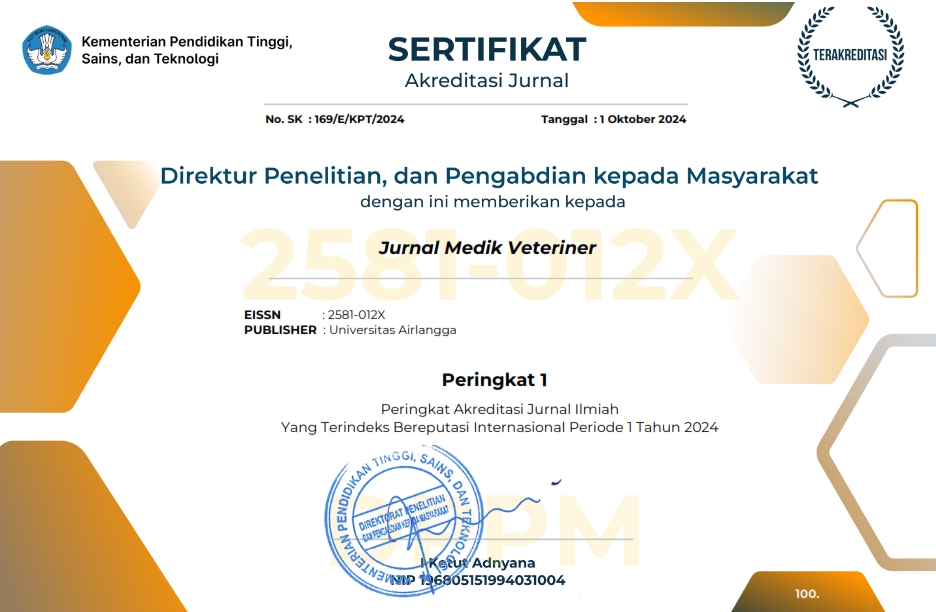Editorial Policies
- Focus and Scope
- Section Policies
- Peer Review Process
- Publication Frequency
- Open Access Policy
- Archiving
- Plagiarism Screening
- Publication Ethics
- Article Processing Charges
Focus and Scope
Jurnal Medik Veteriner (JMV) publishes high-quality and novelty papers focusing on Veterinary and Animal Science. The fields of study are anatomy, pathology, basic medicine, veterinary public health, microbiology, veterinary reproduction, parasitology, animal husbandry, and animal welfare. Food animals, companion animals, equine medicine, aquatic animals, wild animals, herbal medicine, acupuncture, epidemiology, biomolecular, forensic, laboratory animals, and animal models of human infections are considered. Studies using a systematic review and meta-analysis approach are highly appreciated.
Section Policies
Original Research
Review Articles
Short Communication
Case Report
Peer Review Process
1. Initial submission if it does not fit the focus and scope of the journal;
2. Peer-review process decisions;
3. The revision of the manuscript does not conform to peer-reviewed advice;
4. The author does not follow the editor's instructions according to deadlines.
The editor will send a notification of rejection of the manuscript to the author through OJS.
The decision of the editorial board is absolute and free of conflicts of interest.
The article review process usually takes an average of 12 weeks. This review period depends on the editors' and reviewers' duration in reviewing the manuscript.
Publication Frequency
Jurnal Medik Veteriner (JMV) is published biannually year: April and October.
Open Access Policy
This journal provides immediate open access to its content on the principle that making research freely available to the public supports a greater global exchange of knowledge.

This work is licensed under a Creative Commons Attribution-NonCommercial-ShareAlike 4.0 International License.
Archiving
This journal utilizes CLOCKSS systems to create a distributed archiving system among participating libraries and permits those libraries to create permanent archives of the journal for purposes of preservation and restoration.
Plagiarism Screening
The manuscript submitted to this journal will be screened for plagiarism using Turnitin software. Only manuscripts with a <20% similarity index are considered in the peer-review process. This journal can not accept any plagiarism in any manuscript or it will be rejected immediately.
Publication Ethics
Background
Authors may consult the Committee on Publication Ethics (COPE) International Standards for Editors and Authors (http://publicationethics.org/) for guidelines not covered in these guidelines.
Submission declaration and verification
- An article's submission indicates that the work has not been published before (unless it is an abstract or as part of a lecture or academic thesis that has been published), that it is not being considered for publication elsewhere, and that all authors (if any) and the relevant authorities in the place where the work was done have approved its publication, either implicitly or explicitly.
- Upon acceptance, the authors are prohibited from republishing the article in the same form, in English, or in any other language, including electronically, without the written consent of the copyright holder.
Contributors
All authors must have materially contributed to the study and/or article preparation; hence, each author's specific contribution to the paper must be declared. The duties of each author must be specified. It should be stated in the disclosure that all writers have given their approval to the final version of the work.
Everyone named as an author needs to be eligible to be an author. Only those who have made a substantial contribution to the idea, planning, execution, gathering, processing, or interpretation of the work should be eligible for such authorship. Acknowledgment is due to everyone else who contributed to some significant parts of the study but does not meet the requirements for authorship. The corresponding author bears the obligation of authorship; that is, to make sure that all relevant co-authors are listed in the work. On behalf of all co-authors, the corresponding author must submit a form attesting to the fact that each has reviewed and approved the final draft of the manuscript and has decided to submit it for publication.
Authors Responsibilities
Authors must adhere to Jurnal Medik Veteriner (JMV) peer review guidelines. It is the authors' responsibility to provide correct and unique data—neither fraudulent nor plagiarised. About the submitted manuscript and giving the information upon request. No one else should be considering or accepting the submitted material for publication. If any portion of the data has been published elsewhere, the relevant sources must be cited or acknowledged. Reproducing data from other sources requires permission and appropriate citation. It is the responsibility of authors to make sure that animal research are conducted in a way that upholds animal welfare and ethics. It is required to disclose any potential conflicts of interest. We kindly ask authors to be open to publishing retractions, explanations, revisions, and expressions of regret where necessary.
Reviewers Responsibilities
Reviewers are asked to participate in the decision-making process regarding the paper and help improve its quality through an objective review procedure within a predetermined time frame. Reviewers are required to notify the editor of any published or submitted material that resembles the content that is being reviewed. There should be no conflicts of interest for reviewers about the study, its authors, or its sponsors. It is important to protect the privacy of any information that the author or editor provides.
Editors Responsibilities
Editors are fully accountable for and have the power to accept or reject an article. Concerning the articles they approve or reject, they ought to be free from conflicts of interest. When performing their tasks, editors ought to be impartial and unbiased, refraining from discriminating against writers on the basis of their gender, ethnicity, religion, political beliefs, or place of origin. Additionally, articles should only be accepted by editors based solely on academic quality and free from commercial interference. Editors should protect the privacy of reviewers.
Publishing Ethics Issues
The integrity of the scholarly record should be upheld by authors, reviewers, and editors throughout the whole publication process. It is not acceptable for business requirements to take precedence over moral and intellectual values.
Animal Ethic Statement
Whether it entails fish collecting, predator-prey interactions, or invasive surgical operations, Jurnal Medik Veteriner (JMV) lays a great deal of attention on animal/fish welfare and takes this obligation seriously. Every study involving fish or animals in this journal complies with globally accepted ethical guidelines and has been approved by an established ethics committee. It is recognized that regional regulations for animal welfare and collection may vary from those found in Indonesia.
Therefore, authors must attest that the applicable local committee(s) in charge of granting permissions for animal collections and welfare were consulted and granted when submitting a research manuscript that involves animal experiments.
Furthermore, for any submissions to JMV, authors must include clear proof of these permits in the first paragraph of the Materials and Methods section. These are some possible formats for this evidence:
[1] "The rules, regulations, and policies pertaining to animal welfare as approved by [Insert the local or national permitting authority and the permit reference number] were followed in the care and use of experimental animals]."
[2] The committee for the ethics of laboratory animal use research granted its permission for this project with Certificate number XXX [2020/20/UA], Universitas Airlangga, Indonesia.
Conflict of Interest Statement
To ensure the integrity, transparency, and credibility of scientific publishing, Jurnal Medik Veteriner requires that all parties involved in the publication process—authors, reviewers, editors, and journal staff—disclose any potential conflicts of interest. A conflict of interest (COI) may exist when professional judgment regarding an academic manuscript is influenced by secondary interests such as financial gain, personal relationships, or institutional commitments.
For Authors
Authors must disclose any financial or non-financial interests that could be perceived to influence the results, interpretation, or conclusions of their manuscript.
Examples include: research funding, employment, consultancies, stock ownership, honoraria, paid expert testimony, patent applications/registrations, and grants.
Authors are required to include a “Conflict of Interest Statement” in their manuscript. If no conflict exists, authors must explicitly state: “The authors declare that they have no conflict of interest.”
For Editors
Editors must recuse themselves from handling a manuscript if they have any competing interests (e.g., personal, academic, or financial relationships with authors or institutions).
Editorial decisions must be based solely on the academic merit of the submission and its relevance to the journal’s scope.
Any editorial board member with a conflict should disclose it to the Editor-in-Chief, who will assign an alternative editor.
For Reviewers
Reviewers must disclose any potential conflicts of interest before accepting a manuscript review assignment.
Reviewers should decline to review if they have recent collaborations, personal relationships, financial interests, or competitive positions that may bias their judgment.
All reviews must remain objective, fair, and confidential.
For Journal Staff
Journal management staff with knowledge of submitted manuscripts must not use unpublished materials for personal advantage or share them with unauthorized persons.
Any financial, institutional, or personal relationships that may affect journal operations should be declared to the publisher.
Handling of Undisclosed Conflicts
If undisclosed conflicts of interest are discovered after publication, Jurnal Medik Veteriner reserves the right to issue a correction, expression of concern, or retraction in accordance with COPE guidelines.
Transparency Commitment
By enforcing this COI policy, Jurnal Medik Veteriner upholds the highest standards of ethical publishing to protect the integrity of veterinary medical research and maintain readers’ trust.
Journal Policy on Misconduct, Appeals, and Complaints
Allegations of Misconduct
Jurnal Medik Veteriner is committed to upholding the highest ethical standards in scholarly publishing. Allegations of misconduct—including plagiarism, data fabrication, falsification, inappropriate authorship, redundant publication, or unethical research practices—will be taken seriously.
All allegations will be handled following the COPE Guidelines.
If misconduct is suspected:
1. The Editor-in-Chief will conduct a preliminary assessment.
2. Authors will be contacted and asked for an explanation.
3. If concerns are confirmed, actions may include rejection of the manuscript, notification of the authors’ institution, or retraction of the published article.
4. Sanctions may be applied to authors found responsible for misconduct, including bans on future submissions.
Appeals Process
Authors have the right to appeal editorial decisions if they believe:
1. The decision was based on a factual error,
2. Important information was overlooked, or
3. The review process did not comply with the journal’s policies.
To submit an appeal:
1. Authors must provide a clear and detailed explanation of the reason for the appeal, supported by evidence if available.
2. Appeals should be submitted via email to jmv@psdku.unair.ac.id
within 30 days of the decision.
3. Appeals will be reviewed by the Editor-in-Chief and, if necessary, an independent editorial board member not involved in the original decision.
4. The final decision on the appeal will be communicated to the authors in writing. The decision after appeal is final.
Complaints Process
Jurnal Medik Veteriner welcomes complaints about any aspect of the journal’s operation, including editorial processes, ethical standards, or staff conduct. Complaints must be based on evidence and submitted respectfully.
1. Complaints should be submitted in writing to: jmv@psdku.unair.ac.id
2. The Editor-in-Chief will acknowledge receipt of the complaint within 7 working days.
3. An impartial investigation will be conducted, and the outcome will be shared with the complainant within 30 days.
4. If the issue cannot be resolved internally, the complaint may be referred to the Faculty of Health, Medicine and Life Sciences, Universitas Airlangga for further review.
Transparency and Integrity
By implementing these policies, Jurnal Medik Veteriner ensures fairness, accountability, and transparency in its editorial process. Our goal is to safeguard the credibility of veterinary medical research and provide authors, reviewers, and readers with a trustworthy platform for scholarly communication.
Corrections, Expressions of Concern, and Retractions
General Principles
Jurnal Medik Veteriner is committed to maintaining the integrity and accuracy of the scholarly record. When issues are identified in published articles—whether by authors, readers, editors, or third parties—the journal will take appropriate action in accordance with the Committee on Publication Ethics (COPE) guidelines.
All concerns related to published content should be submitted to: jmv@psdku.unair.ac.id.
Corrections
1. Minor errors that do not affect the overall reliability of the study (e.g., typographical mistakes, author affiliation errors, or minor data inaccuracies) may be corrected by issuing a Correction Notice.
2. Correction Notices will be linked to the original article, clearly stating the nature of the change.
3. The original published version will remain accessible, with the correction transparently documented.
Expressions of Concern
1. If serious concerns are raised about a published article, but conclusive evidence is not yet available, the journal may issue an Expression of Concern.
2. This notice will alert readers that potential issues have been identified and are under investigation.
3. Once the investigation is concluded, the Expression of Concern may be followed by a correction or retraction, or it may be removed if no issues are confirmed.
Retractions
A published article may be retracted if:
1. There is clear evidence of research misconduct (plagiarism, data fabrication, or falsification).
2. The findings are unreliable due to error or misconduct.
3. The work has been published elsewhere without proper acknowledgment (duplicate publication).
4. The research is found to involve unethical practices.
5. Retractions will be clearly labeled and linked to the original article, which will remain accessible but marked as “Retracted.”
6. The reason for retraction will be stated to ensure transparency.
Process
1. Concerns are reported to jmv@psdku.unair.ac.id.
2. The Editor-in-Chief will conduct an initial assessment.
3. If warranted, an independent review will be initiated, involving the editorial board and, when appropriate, the authors’ institution.
4. Based on findings, the journal will issue a Correction, Expression of Concern, or Retraction.
5. All actions will be communicated to the authors and publicly documented.
Commitment to Ethical Publishing
By enforcing this policy, Jurnal Medik Veteriner ensures that the academic record remains accurate, transparent, and trustworthy. The journal follows international best practices to protect both the integrity of the scientific process and the trust of its readership.
Funding Statements
Independence of Editorial Decisions
The journal’s financial sponsorship does not influence editorial independence. Editorial decisions—including peer review, acceptance, or rejection of manuscripts—are based solely on scholarly merit, originality, ethical standards, and relevance to the scope of the journal.
Disclosure of Author Funding Sources
1. Authors are required to disclose all financial support received for their research, including grants, institutional support, or industry sponsorship.
2. A Funding Statement must be included in each manuscript, specifying the source(s) of financial support.
3. If no specific funding was received, authors must declare: “This research received no external funding.”
Transparency and Accountability
1. The journal adheres to the COPE and ICMJE recommendations on transparency in research and publishing.
2. Any potential conflicts of interest related to funding must be disclosed in the manuscript.
3. In cases where research funding may raise ethical concerns, the editorial board reserves the right to request additional clarification or reject the manuscript.
Contact Information
For questions or concerns regarding funding policies, please contact the editorial office at: jmv@psdku.unair.ac.id
Article Processing Charges (APC)
a. Article Submission Fee
There is no charge for manuscript submission
b. Article Processing Charge
The author's publication fee amounted to IDR 1.500.000 or USD 200 (abroad) for each manuscript published in the journal.
The publication fee must be transferred to one of the bank accounts below:
Acc No: 8966800000000714 ID: Universitas Airlangga SWIFT code: BMRIIDJAXXX |
Acc No: 9883030300002190 ID: Universitas Airlangga SWIFT code: BNINIDJAXXX |
|
c. Waiver Policy
We consider individual waiver requests for articles in our journal. To apply for a waiver, please request one during the submission process at our email address. A decision on the waiver will normally be made within three working days. However, this journal does not charge for manuscript submission.







11.jpg)



















